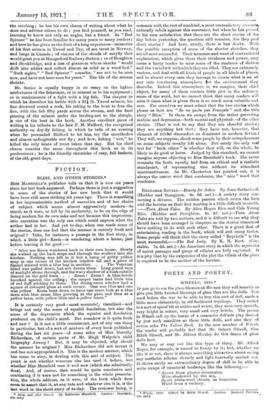FICTION.
BLISS, AND OTHER STORIES.*
MISS MANSFIELD'S publisher tells us that it is now six years
since her last book appeared. Perhaps there is just a suggestion in some of the stories of her new book that it would have been still more striking six years ago. There is something in her impressionistic method of narration and of her choice of subject which seems • almost aggressively modern—to stand, as it were, or fall by its modernity, to be on the edge of being modern for its own sake and not because this impression.
• laic narration was the only one which could express what the author had in her. And yet to-day, when one reads some of the stories, does one feel that the manner is entirely fresh and original ? Take, for instance, a passage in the first story, in which a little girl—Kesia—is wandering about a house, just before leaving it for good :—
" After tea Kesia wandered back to their own house. Slowly - she walked up the back steps and through the scullery into the kitchen. Nothing was left in it but a lump of gritty yellow soap in one corner of the .kitchen window sill and a piece of .flannel stained with a blue bag in another. . . The Venetian blind was pulled down, but not drawn close. Long pencil rays of sunlight shone through, and the wavy shadow of a bush outside danced on the gold lines. . . Zoom I Zoom ! A blue-bottle knocked against the ceiling ; the •carpet tacks had little bits of red fluff sticking to them. The dining-room window had a square of coloured glass at each corner. One was blue and one was yellow. Kesia bent down to. have one more look at a blue lawn with blue arum lilies growing at the gate, and then at a yellow lawn, with yellow lilies and a yellow fence."
It is certainly very good—most accurately visualized—and brings not only the sense of squalid desolation, but also the sense of the depression which the squalor and desolation
produced on the child's mind. But somehow is it quite fresh • and new ? Is it not a little reminiscent, not of any one thing in particular, but of a sort of mixture of every book published
during the last six years—of some sides of Miss Dorothy Richardson, of certain parts of Mr. Hugh Walpole's child biography Jeremy ? But, it may be objected, why should the manner be original ? Miss -Richardson did not invent it
and has not appropriated it. This is the modern manner, which has come to stay, in dealing with this sort of subject. The point is not whether someone else has used it before, but
• whether Miss Mansfield uses it well now (which she admittedly does). And, of course, that would be quite conclusive and convincing if it were not for something in the whole presenta- tion, the whole address, as it were, of the book which does seem to assert that it, at any rate and whatever else it is, is the last word in the short story of to-day. The reviewer being, in • Blinns, and e..ther Stories. By Katherine Mansfield. London : Ocantable. ISs. net.] common with the rest of mankind, a most contradictory creature, naturally rebels against this assurance, but when he has proved to his own satisfaction that these are the short stories of the day before yesterday, the question still remains, Are they good short stories ? And here, surely, there is less doubt. With the possible exception of some of the shorter sketches, they are all most successful. Their terseness and want of conventional explanation, which gives them their vividness and power, may cause a hasty reader to miss some of the neatness of diction and the varied wit withwhichtheyare filled. They are extremely various, and deal with all kinds of people in all kinds of places, and in almost every case they manage to create what is an at any rate convincing atmosphere for the environment they describe. Indeed this atmosphere is, we imagine, their chief object, for many of them contain little plot in the ordinary sense of the word, but we cannot think that many readers will miss it since what is given them is so much more. valuable and rare. For ourselves we must admit that the two stories which please us best are " Je ne pail° pas Francais " and the title story "Bliss." In these we escape from the rather prevailing malaise and depression—both mental and physical—of the other stories. (That is not to say that they are cheerful stories ; they are anything but that ; they have not, however, that element of trivial disoornfort so dominant in modern fiction.) They will, we suppose, shock some people by their outspokenness on some subjects usually left alone. But surely the only real test for " book ethics " is whether they will, on the whole, be likely to do good or harm. Judged by this standard, we cannot imagine anyone objecting to Miss Mansfield's book. She never commits the fault, equally bad from an ethical and a realistic standpoint, of representing vice without its attendant unattractiveness. As Mr. Chesterton has pointed out, it is always the coarse word that condemns, the " nice " word that condones.






























 Previous page
Previous page